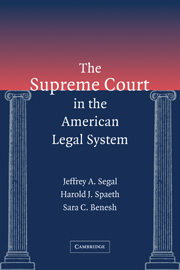14 - The Impact of Judicial Decisions
Published online by Cambridge University Press: 05 June 2012
Summary
Let there be no doubt, while I strongly disagree with the court's decision, I accept it. I accept the finality of this outcome which will be ratified next Monday in the Electoral College…. Tonight, for the sake of the unity of the people and the strength of our democracy, I offer my concession.
– Al Gore, vice president and candidate for presidentOnly one court in the history of our nation has decided a presidential election – the U.S. Supreme Court on December 12, 2000, at 10:00 p.m. The impact of the decision was something never before seen. The Supreme Court, not the voters, “decided the outcome of the 2000 presidential election.” How much more impact, how much more power, can one judicial institution have than that? And Vice President Al Gore's statement introducing this chapter is telling as well. He accepts the decision of the Supreme Court although he emphatically disagrees with it.
Nevertheless, many, including the dissenters in Bush v. Gore, predicted that the Court's reputation would suffer considerably after the decision. Indeed, Justice Stevens wrote in dissent, “Although we may never know with complete certainty the identity of the winner of this year's Presidential election, the identity of the loser is perfectly clear. It is the Nation's confidence in the judge as an impartial guardian of the rule of law.” But by all accounts, the decision did no such thing.
- Type
- Chapter
- Information
- The Supreme Court in the American Legal System , pp. 363 - 392Publisher: Cambridge University PressPrint publication year: 2005



